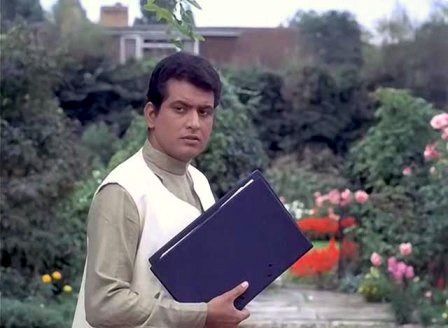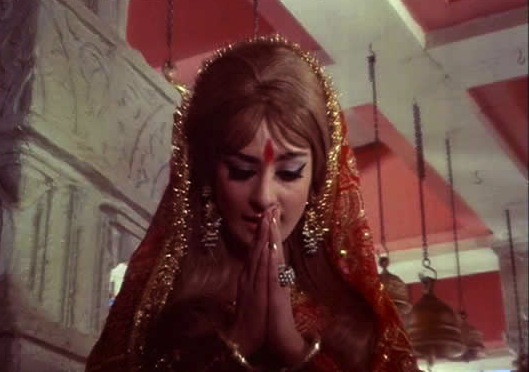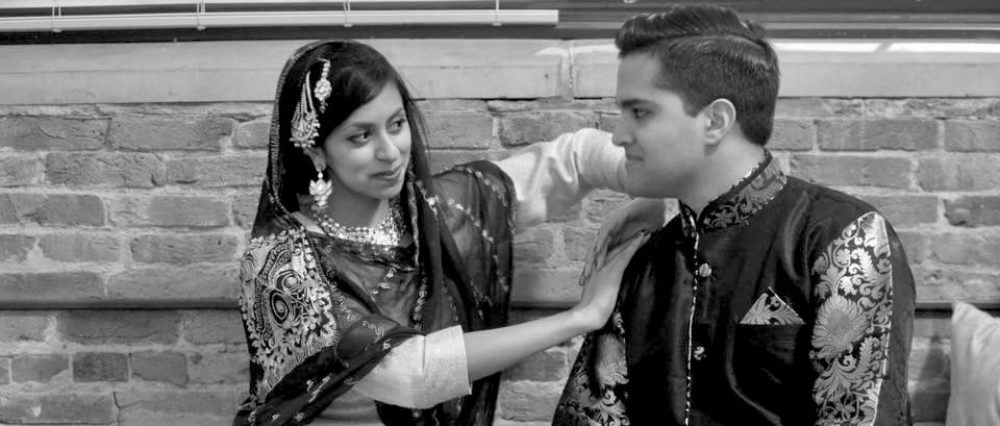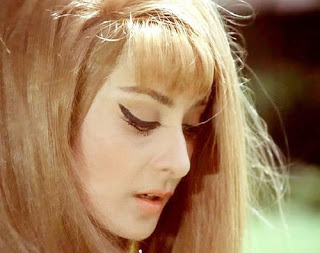
Manoj Kumar plays the righteous Mr. Bharat wooing a wayward Westernized girl in Purab Aur Paschim (1970).
We now present the lyrics and English translation to the haunting love song “Koi Jab Tumhara Hriday” from Manoj Kumar’s cult classic Purab Aur Paschim (1970). The film was one of many patriotic hits by Manoj Kumar that etched his niche as a fighter of Indian values on screen that no other producer or actor could replace. Shot with an entirely overt pro-India agenda that is really more endearing than offensive, Purab Aur Paschim rides on the righteousness of traditional values over the decay and corruption of societies lost to drugs, sex, and disregard for elders. It’s the anti-thesis to Orientalism–a vibrant, exotic lens coloured by everything India wanted to believe existed in the wild, wild West. It’s a film that only Manoj Kumar in his quiet Nehru coats, quivering upper lip, and a sincere belief in the Indian way of life could truly pull off. While the exaggerations of London decadence may seem heavy-handed at times, there’s a real heart in this film that will win you over. See our translation of “Mere Desh Ki Dharti” for more!
“Koi Jab Tumhara Hriday” is a haunting Mukesh solo that stands wonderfully alone without fancy back-up music or elaborate picturization. From the plucking of strings that mark its opening to the quietly fading finale, his song has a unique power. Plus, keeping in line with the extremist traditionalism, how often will you find hardcore Sanskrit-based Hindi films in lyrics like “hriday” or “kanwal“?!
All that said, you can’t ignore that the lyrics are borderline groveling–they are sung by a traditional Mr. Bharat who finds himself in “modern” London and unused to the fast and easy ways of the West. Manoj Kumar falls hard for smoking playgirl Saira Banu–blonde wig, miniskirt, and all–to the point that he proclaims he will wait for her until the end to reciprocate after her other lovers grow tired of her. Is this truly what the perfect Indian man is supposed to be? My former Urdu professor used to have a really negative reaction to Manoj Kumar putting up with a girl like that–and found it pathetic he accepted she had so many other men in her life! Is he really pathetic or just blindly in love? Perhaps Manoj Kumar is simply trying to express that the unconditional love and devotion of the Indian way of life will outlast the fickle West shifting back and forth from empty pleasure to pleasure.
But say what you want about the lyrics, the melody is beautiful and Mukesh’s rendition is filled with emotion that I adore every time. Enjoy our English translation and lyrics to “Koi Jab Tumhara Hriday” below! Follow along here on youtube and let us know your thoughts in the comments!
Koi Jab Tumhara Hriday Lyrics and Translation
Koi jab tumhaaraa hriday toD de
When someone breaks your heart
Tadaptaa huaa jab koii chhoD de
When someone leaves you in suffering
Tab tum mere paas aanaa priye
Then come to me, beloved
Meraa dar khulaa hai, khulaa hii rahegaa tumhaare liye
My door is open, and will always remain open for you
Koi jab tumhaaraa hriday toD de
When someone breaks your heart
Abhii tumko merii zaruurat nahii.N
At the moment you do not need someone like me
Bahut chaahanewaale mil jaaye.nge
You will meet many people who fall in love with you
Abhii ruup ka ek saagar ho tum
For now you are an ocean of beauty
Kanwal jitne chaahoge khil jaaye.Nge
As many lotuses as you desire will bloom for you
Darpan tumhe jab Daraane lage
When your own image in the mirror starts to scare you
Jawaanii bhi daaman chuDaane lage
When your youth begins to leave you
Tab tum mere paas aanaa priye
Then you will come to me, beloved
Meraa sar jhukaa hai, jhukaa hii rahegaa tumhaare liye
My head is bowed to you, and will always bow to you
Koi jab tumhaaraa hriday toD de
When someone breaks your heart
Koii shart hotii nahii.N pyaar mei.N
There are no conditions in love
Magar pyaar sharto.N pe tum ne kiyaa
But your love is based on conditions
Nazar mei.N sitaare jo chamake zaraa
Those stars in your eyes that glittered for a while
Bujhaane lagii aartii ka diiyaa
They have begun to extinguish the candles of devotion
Jab apnii nazar mei.N hii girne lago
When that image of yourself falls in your own esteem
Andhero.N mei.N apne hii ghirne lago
When your own darkness starts to surround you
Tab tum mere paas aanaa priye
Then you will come to me, beloved
Yeh deepak jalaa hai, jalaa hii rahegaa tumhaare liye
This light is burning, it will always remain burning for you
Koi jab tumhaaraa hriday toD de
When someone breaks your heart
Tadaptaa huaa jab koii chhoD de
When someone leaves you in suffering
Tab tum mere paas aanaa priye
Then come to me, beloved
Meraa dar khulaa hai, khulaa hii rahegaa tumhaare liye
My door is open, and will always remain open for you
Koi jab tumhaaraa hriday toD de
When someone breaks your heart
Glossary
hriday: heart, liver; priya: beloved; dar: door; zaruurat: need; ruup: beauty, saagar: ocean; kanwal: lotus; Darpan: mirror; Daraane: to scare; jawaanii: youth; sar jhuknaa: to bow your head; shart: condition; sitaaraa: star; chamaknaa: to sparkle, to glitter; aartii: a common Hindu devotional prayer; diiyaa: small clay candle; girnaa: to fall; ghirnaa: to cloud, to surround; andheraa: darkness; deepak: light
Note: Take careful note of the use of the verbs ghirnaa and girnaa that are found side-by-side in these lyrics. They sound extremely similar but mean different things!

Yes, surprise surprise, Saira Banu reforms her wicked Western ways by the end of the film and bursts into a beautiful Lata rendition of aarti back in the motherland. Oh, looks like you forgot to remove and burn that blonde wig. Woops.
Did you know this song was actually filmed at Oxford University? Watch the video carefully–the trimmed lawns and elegantly gated deer are from none other than Magdalen college! I only wonder what all the hip 60s British college students must have been thinking as they watched the filming take place…
-Mrs. 55


I had seen this movie when I was in 9th or 10th std and had found it too loud. And everytime I think of watching it again, I remember how over the top and screechy Saira’s character was and that just puts me off.
I know perception changes with time and age. I still remember crying over Hariyali Aur Raasta back then and had liked it so much that it was among my favourite films for quite a long time. I watched it again few years ago and I found it just ok.
I like Manoj Kumar, more in his black and white movies, before he got typecasted as a typical patriotic actor/director. Not that I dont like his patriotic movies, I love Shaheed, Kranti, Upkaar, Roti Kapda Aur Makaan etc, but Purab Aur Pashchim never created that impression on me. But having said that, I do like its songs – esp this one and Main bharat ka rehne wala hoon.
Still ROTFL at “quivering upper lip” 😛
It goes without saying that everyone has heard the songs from this movie and had them ingrained into our minds. This pair defined east/west standards for several generations to come with movies like this and the “good east morals and bad west values” with the extreme view has stayed even to this day for many people. The song however is about unconditional love and that is universal. As shown in the movie it is only an eastern virtue which Saira cannot have until she comes back to her Indian roots.
very much agree with you anonymous…..
Great thoughts!! I agree as well–take 2007’s “Namastey London” that plays on extremely similar themes even in our “modern day” context. Some things never die!
Hahah yeah Saira’s well-known for that screechy (adorable?) voice of hers–and she’s definitely every level of offensive in this film. Don’t even make me bring up the “Twinkle Twinkle Little Star” song!!
But it’s true perceptions changes over the years and some things about this film will remain strong. The scene in the nightclub in which an equally Westernized Pran declares that India has given the world “zero!” is one of the most memorable and powerful. As a reply, Manoj Kumar bursts into the song you mention in which he talks about the tremendous impact of India discovering the number zero and how wonderful the country is in general. Cheesy, sure. But I’ll take it any day!
A great black-and-white Manoj Kumar film is of course “Woh Kaun Thi?” which always makes my list of favorites–nothing to do with patriotism whatsoever!
Among the few famous, melodious songs, this is one I cannot come to grips with.
I love the music, & understand the sentiment being portrayed – about unconditional love.
But the way the main stanza has been worded, almost sounds like a ‘bad-dua’ rather than a ‘dua’ – ‘fine, not me, but be happy wherever you are, with whomsoever you choose…’, “I’m happy in Your happiness”
Manoj Kumar does try to bend his head to soften the impact of his words, but he fails miserably – he is SO stiff & formal !
The line I Do like is : Koii shart hotii nahii.N pyaar mei.N
It’s true–a certain kind of bitterness can be read into his words for after all, he’s still a scorned Indian man! At times the formality of his manner seems like an anachronism even for the 60s/70s, but he sorta had to swing in the other extreme in order to balance the crazy sauce of Saira Banu’s histrionics haha.
Great blog as usual! Haunting melody is right- talk about the conflict between desire for a loved one and vengeance about being spurned!
BTW, the comment on the “shudh” Hindi is very interesting. I am not sure why Bollywood’s legacy is based more on Urdu rather than Hindi but probably reflects the dominance of northern Indian influence. Urdu itself is such an interesting language- words from Persian but structure that is so Indo-Aryan. Its a lovely melodious language but so is Hindi- one can only wonder if Bollywood had chosen Hindi as its preferred medium, then many more cultures with languages derived from Latin-Sanskrit roots may have flocked to it. To mention an obvious example from your blog- notice the resemblance between “hriday” and “heart”!
BTW, there are a few Bollywood classics that are so strong in Hindi- Aavishkar for instance starring none other than your favorite-Rajesh Khanna, with the immortal song
“Hasne ke chaah ne kitna mujhen rulaiya hai”
Keep it up!
You’ve actually brought up a really fantastic point about Hindi cinema in general! It’s something that has fascinated both Mr. 55 and myself for a long time–why the lingua franca of films leaned toward more Urdu and less toward the Hindi end of the Hindustani spectrum. There are several theories–one, is of course that the poets dominating the cinematic scene in the early days happened to me more entrenched in Urdu traditions (eg. Sahir Ludhviani). In many countries, it’s often the way that a certain group dominates the film industry before others break in, regardless of the needs of the masses. But it’s more complicated than that and the etiology may well be the subject of an upcoming post! Thank you for bringing it up!
The message is of unconditional and ever-enduring love, yes, but is it really only an Eastern virtue? Isn’t love more personal than cultures dictate?
Just because traditionally Eastern cultures frown on divorce many people live a life of unhappiness (until they get used to each other anyway) but it doesn’t mean that their love is stronger.
The stanza where he is telling her that her youth and beauty are the reason why she has so many admirers and that it will all fade with time is applicable even when we all look at flowers. That, indeed, is the sad truth.
You’re quite right–unconditional love is and should be universal! However, in this film, Manoj Kumar has a strict agenda and wishes to portray all things good and pure as “Indian” and all things decadent or dishonorable as “Western.” And sadly, it’s a mindset still espoused by many. I too love the lines about her fading beauty and “Darpan tumhe jab Daraane lage”–they’re a figurative slap in the face that she clearly needs!
I never liked this song, though the movie was incredible as was Saira Banu’s wig. Speaking of her, I feel certain that in The Beatles movie, HELP!, there was a poster of her in an Indian restaurant where a scene took place. I’ve tried looking into this in the past but you two have better skills at finding interesting facts. Let me know if you unearth something!
Whoa interesting bit of trivia!! I’ll have to watch “Help!” again and try to decipher where the poster came from! Since Help was released 5 years before Purab Aur Paschim, it seems unlikely that Saira Banu’s filming schedules in London would’ve overlapped, but that’s not to say publicity about her as an actress would not have made it to the UK well before that. For all we know, it was a personal touch from George!
I don’t know about Help, but more recently I believe this movie appeared briefly in Gurinder Chadha’s “Bride and Prejudice” during a chase scene of some kind.
It seems that in contemporary Bollywood, there are many movies that feature the same theme: Western influence on traditional Indian values. This was probably the first movie in this category. However, there are many other movies that portray Westernized characters whose ideas of love, marriage, family, and community have been harmed by Western influence. Take the movie Garam Masala for example. Do Mr. and Mrs. 55 think that it is important for Bollywood to produce these kinds of movies? What is the message Bollywood is trying to send with these movies?
As with every culture, I suppose there is an inherent desire to promote a kind of superiority and idealism of a way of life that threatens to be replaced. I remember watching Shah Rukh Khan’s Pardes and Dilwale Dulhania Le Jayenge growing up, which insist upon a return to traditional morals and the wholesomeness of a good Indian upbringing. You’re quite right, in Bollywood those films were a dime a dozen for years–but look how they are slowly vanishing now. It used to be the hero was the one who spurned Westernization, but now it is celebrated and often accepted as the commonplace reality it truly is for many Indians. Films like Garam Masala and No Entry which turn extra-marital affairs into comedy instead of drama may even be seen as less “Western” and more “modern” for India has changed with the times, whether we like it or not!
Pingback: Five Anti-Feminist Bollywood Songs That Will Make You Cringe « Mr. & Mrs. 55 – Classic Bollywood Revisited!
Hello,
Just wanted to let you both know that I’m so grateful for having found you via google search this morning while looking for English translations of my fav old hindi songs.I also shared this link here with someone who matters:) This is a great blog.
Love
sheela
Love should not restricted to mere physical bodies but more than above. Affection certainly bow towards unconditional love which stands as holy God. This is eternal and a flow of holy hindu tridition which comes as pure water from Gangotri.
I love this song and the beautiful mix between Hindi/Sanskrit and Urdu words. Also the signature tune of the string instrument at the beginning (as of 0:21) sounds very influenced by Muslim musical traditions to me; would you agree? The lyrics are SO sharp! Thank you for existing Mr. & Mrs. 55! So fun to have found you! A question about the translation Tab tum mere paas aanaa priye to Then you will come to me, beloved. Shouldn’t it be in the Imperative: then come to me, beloved? If…then.. or jab…tab. It’s the tormented imperative that makes the words so strong.
This song feels more like a guilt trip to me, and a tad passive aggressive with a tinge of self-righteousness. I was never a fan of Manoj Kumar’s Mr. Bharat but his movies had good soundtracks and the songs were well done on the screen. Upkar, Purab aur Pashchim, Shor and Roti Kapada aur Makaan come to mind.